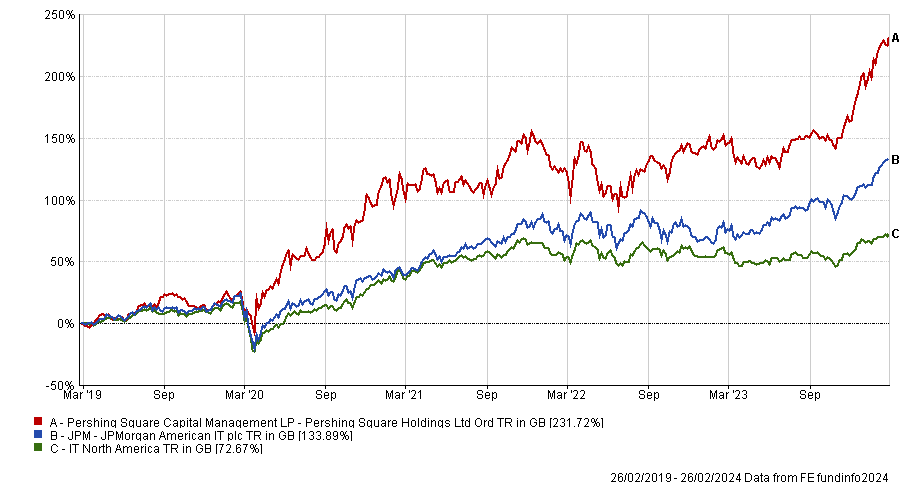Pershing Square Holdings has a history of headline-grabbing derivatives trades that have delivered billions of dollars in profit, a track record of top-quartile performance over one, three and five years, and a star manager in US hedge fund veteran Bill Ackman. Yet the UK’s third-largest investment trust (with a market capitalisation of £7.3bn) persistently trades at a significant discount.
While this is narrowing, it is not a rapid pace of change. Its discount tightened from 33% to 29% over the course of last year and has come in further to 26% during the past two months, but remains wide.
One catalyst for a turnaround in investor sentiment could be the launch of Pershing Square USA, a US-listed, closed-ended fund with a similar investment strategy to the UK trust, which owns a concentrated portfolio of eight to 12 North American companies, complemented by derivatives trades that tend to perform well when the core portfolio of stocks falls.
As well as benefits such as marketing efforts on the new fund throwing the UK version back into the spotlight, there are more tangible plus points.
The US portfolio will not charge a performance fee but it will have a 2% management fee, 20% of which will be used to offset the UK trust’s performance fee of 16% above a high watermark. (The UK version also charges a 1.5% management fee.)
This means if Pershing Square USA raises $10bn, then 20% of its 2% management fees will equate to a $40m reduction in the UK trust's performance fees.
Below Trustnet asks experts whether this will be enough to turn around the trust’s fortunes, or if investors should remain wary.
Matthew Read, senior analyst at QuotedData, said there was a lot for investors to like, particularly around Pershing’s performance.
The trust has more than tripled investors’ money over five years and returned almost double that of its next closest rival in the IT North American Sector – JPMorgan American – as the below chart shows.
Share price total return performance of trusts vs sector over 5yrs

Source: FE Analytics
Read said: “Despite this peer group beating performance, Pershing has the widest discount amongst its peers – 26.3% at the time of writing – with JPMorgan American trading close to par.
“Given its long-term performance record, this does not make sense, particularly as Pershing has been very active in the market for its own shares – it has repurchased around $1.3bn worth of shares to date, with around $205m of that over 2023.”
Winterflood equity research analyst Shavar Halberstadt also highlighted the trust’s differentiated investment strategy, with its hedging approach offering “upside that is not available through a benchmark”.
“While famously engaging in widely publicised short strategies in the past, there is no intention to do so at present. Instead, efforts are focused on collaborative engagement with management to create or unlock shareholder value, applying private equity-like strategies to public markets. Holdings are closely monitored for margin expansion, capital deployment and other metrics, and tend to have both growth and annuity characteristics.”
Investors might be concerned about the new funds being a distraction, said Ewan Lovett-Turner, head of investment companies research at Deutsche Numis. The trust’s last period of poor performance in 2015 and 2016 arose when Ackman was distracted by a “high profile short in Herbalife, as well as an ill-fated investment in Valeant Pharmaceuticals” and the need to court investors to stem the tide of redemptions.
However, since then, Pershing Square Capital Management has built a deep bench of talent around Ackman, with Ryan Israel taking on chief investment officer duties and most members of the investment team having a seven-year tenure or longer, Lovett-Turner said.
Ackman’s prominence on social media has also been flagged as a distraction but Halberstadt believes his high profile could be turned into Pershing’s advantage. Regulatory constraints prevent Ackman from marketing the UK trust in the US because it isn’t available to American investors, but when he launches the new US-listed trust he will be permitted to publicise its investment strategy.
“Ackman’s prominence on social media may have caused concern for some, but in light of this venture we believe that it should perhaps be viewed as an asset,” Halberstadt said.
However, not all are convinced that this will be enough to turn things around. The £1bn AVI Global Trust recently sold out of Pershing Square Holdings, having initially invested in 2017. Since then, the position has generated a 21% internal rate of return.
Joe Bauernfreund, chief investment officer of Asset Value Investors (AVI), said: “It has been a tremendous investment for us, we still like the portfolio and we think it’s on too wide a discount.”
Yet he believes the trust does "deserve" to trade at a discount given its “extremely high” fees.
Additionally, while the US version could be considered beneficial, both Bauernfreund and Lovett-Turner suggested that a similar product without performance fees could convince investors to switch to the US version. The new launch “doesn’t create a new source of buyers,” Bauernfreund added.





